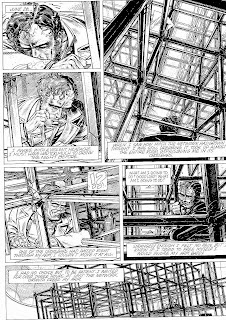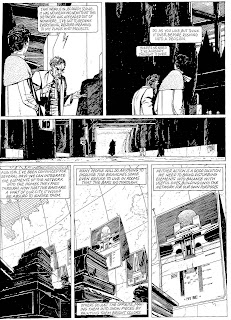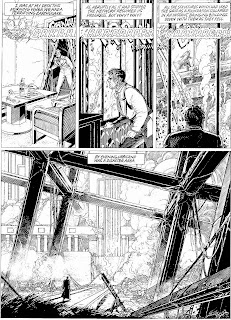We’ve had a lot of interesting comments on the race and comics roundtable, some of which point in similar directions — so rather than going through and saying the same thing over and over, I thought I’d try to hit some main points in this post.
So to start with, I thought I’d address a point Uland brought up:
lso, we live in a Western Republic, founded by Europeans and still majority European ( not for long, I know). That entertainment and art follow, I don’t think we should be surprised by.
It’s not like we’re willing to go to Ireland and demand that they adapt the way they tell stories to make Eastern European immigrants feel more culturally powerful than they are.
This is more or less, I think, a variation on Pat Buchanan’s, “Traditional Americans Are Losing Their Nation, (though without the apocalyptic vision and the implicit clal to arms that makes Buchanan’s stance here truly execrable.) Basically, the argument is that we, as a nation, are white; that’s our cultural heritage, our true American European self, and so it’s natural to focus on that. Other traditions, or people, are extraneous to who we really are.
Andrew Sullivan had a fine rebuttal of this position:
From its very beginning, after all, America was a profoundly black country as well.
This took a while for an Englishman to grasp upon arriving here, because it’s so easy to carry with you all the subconscious cultural baggage you grew up with. England, after all, is deeply Anglo-Saxon. It makes some sense to refer to England’s roots and ethnic identity as white, its language as English, its inheritance as a deep mixture of Northern European peoples – the Angles and the Saxons and the Normans and the Celts. And superficially, English-speaking white Americans might seem in the same cultural boat as white English people, dealing with a relatively new multiculturalism in an increasingly diverse and multi-racial society. And at first blush, you almost sink into that lazy and stupid assumption, especially if you arrive in Boston, as I did, and carried all the usual European prejudices, as I did.
The English, lulled by their marination in American pop culture from infancy, and beguiled by the same language, can live out their days in this country never actually noting that it is an alien land – stranger than you might have ever imagined, crueler than you realized, but somehow also more inspiring than you ever thought possible. This is the America I am trying to make my home, after 25 years. It is not the America of Pat Buchanan’s or John Derbyshire’s fantasies.
It struck me almost at once, if only in the music I heard all around me – and then in so many other linguistic, cultural, rhetorical, spiritual ways: white Americans do not realize how black they are. Even their whiteness is partly scavenged from the fear of – and attraction to – its opposite. Even something as stereotypically white as American Catholicism, I discovered to my amazement, was also black from the very start. (Yes, those Maryland slaves. If you’ve never been to a Gospel Mass in an ancient black Catholic parish, try it some time.)
And it’s not just that America’s black. America’s also Amerindian. And, of course, and very much so when you’re talking about comics, Jewish. In short, America is it’s own culture — and what’s most distinctly American about it is its syncretism. There’s nobody more American, as just one example, than Rosa Parks. Hers is a tale of the plucky salt of the earth overcoming the unjust vagaries of the fascist state. What’s more American than that?
So the plea for comics to stop being so unutterably, lamely pale isn’t a plea for them to be less American. It’s a suggestion that they be *more* American.
So why does it matter if comics are more American. Who cares? Uland puts it this way:
I know black comic fans. They’re nerds, just like a lot of white fans. I think to suggest to them that they require a black superhero, or a black creator to feel some kind of connection to that material is pretty insulting, and it’s just not evident. You can’t say that if comics were more minority friendly, more minorities would be involved. By that logic, white people, as a rule would be far more interested in comics than they are. They’re not. Comics are for children, slightly fucked up adults, or slightly pretentious fucked up adults.
Ed Howard comes at it from a different place, but arrives at a similar conclusion:
Modern superhero comics, with few enough exceptions, are pretty dismal affairs that don’t really address anything of substance, and where any kind of risk-taking or experimentation is pretty soundly discouraged, for all sorts of economic reasons. Why should race be any different? I mean, if we’re talking about Supergirl, as the last post in this roundtable did, doesn’t a book like that have broader limitations and failings than just the failure to represent ethnic diversity properly? It’s rearranging the deck chairs on the Titanic.
For both Uland and Ed, comics are essentially debased and irrelevant. Talking about race is therefore pointless, because only a select few fucked up individuals are going to read them anyway.
But…if everyone agrees that mainstream comics are an (ahem) ghetto of mediocrity…how did that happen? Why are they like that?
Let’s take a brief detour, and talk about another extremely white genre — country music. It’s not a secret especially why country is largely white. It’s because of systematic racism and segregation in the early part of the 20th century, when the genre was formed — and of the split between hillbilly and race records which was explicitly segregationist. It’s persisted because of genre coherence, white populism, and (I presume) black alienation because of white populism. It isn’t about dictats handed down from on high, necessarily, but it is about racism, and a history of racism.
Now, even though country was born out of segregation, it wasn’t actually European. It’s roots were as much in the blues and jazz as in Irish or European folk song, and even it’s instrumentation and vocal styles (from the banjo to Jimmie Rodgers) were integrated. And that’s where a lot of the genre’s energy came from; form a mixing of white and black styles which produced western swing and bluegrass and hillbilly boogie and rockabilly. After rock took over most of the syncretic energy of white pop, though, country kind of flailed, turning more and more to nostalgia, unable to assimilate the changes in black music (like rap) that were leading the way for pop. And as a result you got a lot of really shitty music (country is kind of trying in various ways now to make peace with black pop, and I think country radio is more listenable at the moment than it’s been in some time.)
The point of all that, I’d argue, at least, is that comics aren’t so insular that any discussion of race is irrelevant. Rather, they’re insular because they have, for a really long time now, more or less deliberately cut themselves off from vast swathes of audience and inspiration.
Steven Grant in his contribution to the roundtable says:
white male heroes must be heroic at all times. I never got that pressure when writing minority or female characters; they were “allowed” (mainly by lower editorial expectations, I think) to make more human decisions for more human reasons. It wasn’t that editors were either specifically racist or felt those characters should have greater emotional latitude.
Steven’s point is that expectation are lower for non-white characters, which is no doubt true. But I wonder if part of what he was experiencing was also just the kind of opening up of possibilities you can get when you start having conversations or interactions with other folks. Writing about somebody who is not all white all the time isn’t a big step, but it is a step towards the kind of cultural interplay that gave us bluegrass, and jazz, and fusion, and graffitti, and blaxploitation, and manga, and, for that matter, in many ways, Superman. That’s where the most exciting American creative endeavors have come from, always.
In this sense, Uland is precisely and staggeringly wrong when he claims that if people liked their own culture best, then there would be more white people reading comics. On the contrary, white Americans don’t read comics because *it’s not their culture.* It’s too white; it’s too boring; it’s too irrelevant and male and stodgy. White Americans, like all Americans, prefer things like, oh, say, pop music or rap music — art that mixes and matches influences and perspectives in exciting ways; that uses that mixing as a spur to the imagination.
In short, comics appeal to nobody and are irrelevant because they appeal to nobody, and are irrelevant. They sit there staring at their navels, and, as a result, the only folks who want to engage with them are people who want to sit around staring at their navels. This isn’t a problem for the culture at large — it’s not a “oh, no, comics are racist — it’s unjust!” On the contrary, it’s a problem *for comics.* When Vom Marlowe talks about being turned off by the blinding paleness of mainstream comics, she’s not talking as a member of the PC police, spoiling everyone’s fun. She’s talking as *a potential fan*, someone who has an interest in the medium and who feels excluded because the world she lives in and cares about and likes to interact with is being gratuitously ignored. And you know what? Most people feel like that, which is why comics are continuing their ongoing downward spiral into ever more pointlessly insular clusterfuckery.











































